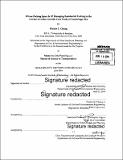Whose parking space is it? : managing residential parking in the context of urban growth : case study of Cambridge, MA
Author(s)
Chang, Winnie C
DownloadFull printable version (29.19Mb)
Alternative title
Managing residential parking in the context of urban growth
Other Contributors
Massachusetts Institute of Technology. Department of Civil and Environmental Engineering.
Advisor
Frederick P. Salvucci.
Terms of use
Metadata
Show full item recordAbstract
In the context of urban growth, how can a city approach residential parking issues? Cambridge, MA is experiencing rapid growth in real estate development and investment, shifts in demographics and travel behavior. How do these changes impact residential parking? Questions such as, "Who has a right to a curbside space?", "How much should it cost?", and "How much regulation is desirable?" trigger antagonistic reactions in the best of times. This research illustrates the complexity of parking problems and provides a framework for breaking parking disputes down to their spatial, political and institutional issues. Three multi-block sites in Central Square (CS), Area 4/Wellington-Harrington (A4) and East Cambridge (EC) are manually surveyed for parking supplies and utilization rates. 75-95% of on-street and 6-45% of off-street spaces are occupied during night counts. Total registered vehicles (2011) in CS, A4 and EC exceed on-street parking supply. This does not necessarily indicate a physical parking problem exists. But it does illustrate that under the assumption residents have an equal right to public space, eligible vehicle owners in practice have claim to only a fraction of a curbside parking space. 'No Intervention,' 'Parking as a Public Asset' and 'Priority to Locals' are ideologies used to explore interventions, which focus on changes to the residential parking permit program, shared parking uses and tie-ins to new development approvals. The most effective ideology is managing parking as a public asset. Increasing the residential parking permit price with an income based structure is strongly recommended, in addition to greater city efforts to collect data on current parking conditions and continued campaigning by city and community representatives to ensure local interests are represented in significant projects such as the Sullivan Courthouse redevelopment. Parking disputes can invoke impassioned reactions in the sanest of individuals. Finding a solution that addresses spatial, political and institutional issues is challenging, requires accurate information, and a willingness to attempt, evaluate and learn from errors. But it can be done.
Description
Thesis: M.C.P., Massachusetts Institute of Technology, Department of Urban Studies and Planning, 2014. Thesis: S.M. in Transportation, Massachusetts Institute of Technology, Department of Civil and Environmental Engineering, 2014. Cataloged from PDF version of thesis. Includes bibliographical references (pages 97-102).
Date issued
2014Department
Massachusetts Institute of Technology. Department of Civil and Environmental Engineering; Massachusetts Institute of Technology. Department of Urban Studies and PlanningPublisher
Massachusetts Institute of Technology
Keywords
Urban Studies and Planning., Civil and Environmental Engineering.